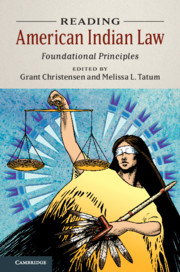Book contents
- Reading American Indian Law
- Reading American Indian Law
- Copyright page
- Dedication
- Contents
- Editors and Contributors
- Preface
- Acknowledgments
- Introduction
- Part I Core Concepts
- Part II Voices
- Part III Property
- 9 Sovereignty and Property
- 10 The Legacy of Allotment
- 11 A Common Law for Our Age of Colonialism: The Judicial Divestiture of Indian Tribal Authority over Nonmembers
- 12 In Defense of Property
- Part IV (Mis)Understandings
- Book part
- References
9 - Sovereignty and Property
from Part III - Property
Published online by Cambridge University Press: 11 December 2019
- Reading American Indian Law
- Reading American Indian Law
- Copyright page
- Dedication
- Contents
- Editors and Contributors
- Preface
- Acknowledgments
- Introduction
- Part I Core Concepts
- Part II Voices
- Part III Property
- 9 Sovereignty and Property
- 10 The Legacy of Allotment
- 11 A Common Law for Our Age of Colonialism: The Judicial Divestiture of Indian Tribal Authority over Nonmembers
- 12 In Defense of Property
- Part IV (Mis)Understandings
- Book part
- References
Summary
Sovereignty and Property: uses the US Supreme Court’s 1989 decision in the case of Brendale v. Confederated Tribes as a vehicle for exploring ways in which the United States government, and the United States Supreme Court in particular, has treated Indian property differently than it treats property owned by non-Indians. In Brendale the Court concluded that tribes possessed the ability to zone only those parts of the reservation which retained their ‘Indian character.’ Singer demonstrates that the Court’s inconsistent treatment of tribal governments - sometimes treating them like sovereign governments and sometimes like private property owners – is driven by a particularly Western European philosophical conception of property.
- Type
- Chapter
- Information
- Reading American Indian LawFoundational Principles, pp. 215 - 237Publisher: Cambridge University PressPrint publication year: 2019

